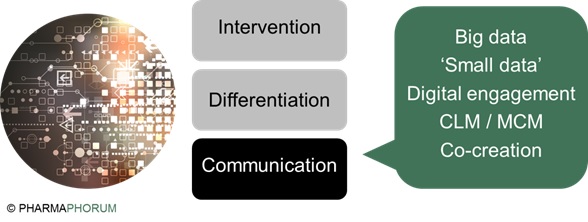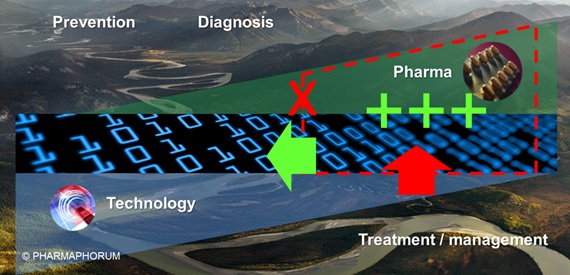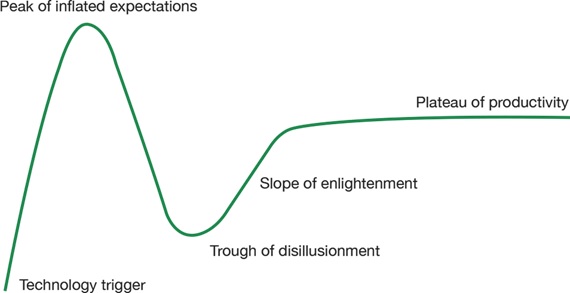Tunnah’s musings: Being connected is the only way for pharma in 2016

In the final month of 2015 Paul Tunnah took part in a webinar looking at how the digital landscape has changed the way we communicate in healthcare, but the opportunity for the pharmaceutical industry goes way beyond how we engage, he muses.
Last week I took part in a webinar (now available on demand) entitled 'Digital healthcare: be connected or be irrelevant', alongside Dr Tim Ringrose from M3 Europe and Paul Mannu from Cello Health Insight. The premise of the discussion was that the challenges currently being faced by health systems all over the world can only be effectively tackled by a highly collaborative and communicative healthcare ecosystem, including the pharmaceutical industry.
But for me it goes further than that – a pharmaceutical industry that can continue to become more collaborative and communicative is one that can really embrace the technology revolution and deliver better solutions. Broadly speaking, technology presents three opportunities to the industry (Figure 1):
• Communication: new ways of understanding and engaging with customers and influencers, such as social media, multichannel marketing and big data analysis.
• Differentiation: building complementary digital solutions alongside medicines, such as applications to improve diagnosis and adherence.
• Intervention: expanding into using digital solutions as novel therapeutics in their own right, e.g. pre-medication diabetes management tools.
"I firmly believe you cannot produce effective health solutions without co-creating with doctors, patients and other stakeholders"
However, the communication aspect also underpins technological differentiation and intervention, because I firmly believe you cannot produce effective health solutions without co-creating with doctors, patients and other stakeholders. 'Small data' – those deep conversations with key individuals – can be just as useful as big data.

Figure 1: The technological opportunities for the pharmaceutical industry
The reality is that, even where pharmaceutical companies are not engaging more regularly with these other stakeholders, they are most definitely engaging with each other, driven by how technology has democratised access to health information. In particular, the patient voice has been dramatically amplified by educational channels, online communities and highly vocal empowered patients who are fighting to have equal share of voice with healthcare providers, regulators and commercial companies (and winning).
This is where things get really interesting with regard to technology in healthcare, because the tech companies coming into this space have no preconceptions around whether, and how, they should engage with patients. They are bringing a fresh business-to-consumer market mentality of being close to the customer and constantly improving products and services – perpetually beta health solutions.
So should the pharmaceutical industry fear these new technology players or collaborate with them?
"So should the pharmaceutical industry fear these new technology players or collaborate with them?"
I see two possible futures for pharmaceutical companies, depending on which route they take (Figure 2). Let us first assume that the pharmaceutical industry is predominantly focussed on treating disease, whereas health technology companies are arguably placing more emphasis on prevention and diagnosis (think of applications like Apple's HealthKit and 23andMe).
If pharmaceutical companies stand back and stick to existing models (marked in red in Figure 2), they run the real risk of seeing technology companies move in to the treatment space (e.g. Google's Calico and 23andMe investing in drug development) and at the same time preventing 'patients' needing drug treatment through earlier diagnosis or even prevention.
But for those pharmaceutical companies willing to partner with technology startups there is a real opportunity to expand further upstream into prevention and diagnosis, and to use technology to enhance their position in treatment. In other words, to have a true focus on wellness rather than disease management.

Figure 2: Two possible futures for pharma as health technology evolves
To me, it seems like a very simple choice for pharma – partner or see your market gradually disappear.
If the positive way forward is therefore for the pharmaceutical industry to become better connected with healthcare providers, patients and technology companies, the question is where we are on that evolution. Has technology met the promise of, to borrow the pharmaphorum tagline, 'bringing healthcare together'?
Here, the Gartner Hype Cycle (Figure 3) can be applied to using technology for better communication. For those not familiar with it, the premise is that new technology only becomes useful once we stop focussing on the technology itself and start understanding how we can actually use it effectively. In other words, we will probably fail with it before we succeed.

Figure 3: The Gartner Hype Cycle in the context of communication technology
In the webinar, we asked the audience where we were on this curve and the consensus was that we are still at the peak of inflated expectations, in that we are not using technology the right way to communicate. But I take a more optimistic view in that I think some lessons have been learned (in areas such as mobile technology, applications, online communities and social media), leading many to the trough of disillusionment and, in some cases, out of it into the slope of enlightenment. It is here that the industry will realise the benefits of technology to be better connected.
Ultimately, being connected is the only way for the pharmaceutical industry to go in 2016, whatever each individual company's business direction entails.
Until next month, let's look forward to a 2016 of healthcare collaboration, have a great Christmas and New Year and, of course, stay well.
About the author:
Paul Tunnah is CEO & Founder of pharmaphorum media, which drives better communication and collaboration between the pharmaceutical industry and other healthcare stakeholders. Today, the group encompasses both the digital thought leadership publication, www.pharmaphorum.com, and pharmaphorum connect (www.pharmaphorumconnect.com), the trusted healthcare media consultancy, which helps clients tell a clear, engaging story that connects with the right audiences and influencers using pharmaphorum's global healthcare networks.
Dr Tunnah holds an MA in Biochemistry and DPhil in Biological Sciences from Oxford University.
For queries he can be reached through the site contact form or on Twitter @pharmaphorum.
Have your say: How can the pharma industry become more connected?
Read more from Paul Tunnah:










